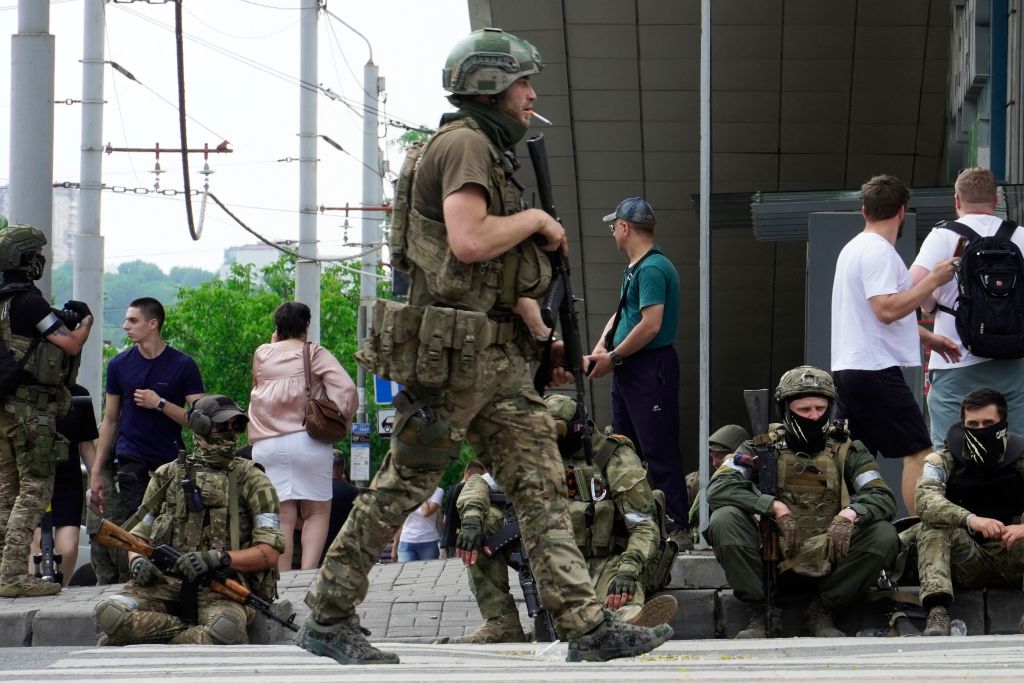Wagner Group stops armed rebellion toward Moscow


A free daily email with the biggest news stories of the day – and the best features from TheWeek.com
You are now subscribed
Your newsletter sign-up was successful
Members of the mercenary Wagner Group stopped their armed rebellion against Russian forces on Saturday, as mercenary leader Yevgeny Prigozhin said that he would move to Belarus following an effort by his troops to topple Russia's defense minister in Moscow.
After a series of negotiations helmed by Belarusian President Alexander Lukashenko, the Kremlin announced that the Wagner push into Moscow had been halted. Prigozhin has agreed to move to Belarus and will not face prosecution by Russia, per The Associated Press, nor will any of the Wagner troops who joined him.
The truce comes in the wake of one of the biggest threats to Russian aggression since the start of the war in Ukraine, as a growing feud between Prigozhin and the Russian military devolved into conflict on Friday. The Wagner Group, a collection of private mercenaries that previously fought alongside Russia, began an invasion of their own, with reports emerging that Wagner fighters "crossed from occupied Ukraine into Russia on at least two occasions," according to intelligence from the British Ministry of Defense (MOD).
The Week
Escape your echo chamber. Get the facts behind the news, plus analysis from multiple perspectives.

Sign up for The Week's Free Newsletters
From our morning news briefing to a weekly Good News Newsletter, get the best of The Week delivered directly to your inbox.
From our morning news briefing to a weekly Good News Newsletter, get the best of The Week delivered directly to your inbox.
Wagner mercenaries took over the city of Rostov-on-Don, about 660 miles south of Moscow, the British MOD tweeted. This location is a military stronghold for the Russian military, and Wagner "has almost certainly occupied key sites" in Rostov, the British MOD said, "including the headquarters which runs Russia's military operations in Ukraine."
Russian President Vladimir Putin released an address calling the Wagner Group's actions "a stab in the back," vowing to punish those who had "betrayed" Russia. Putin, who was previously a close ally of Prigozhin, did not mention the Wagner leader by name, but said those "who prepared an armed rebellion, stood on the path of blackmail and terrorist methods, will suffer inevitable punishment."
Updated June 24, 2023: This article has been updated throughout to reflect recent developments.
A free daily email with the biggest news stories of the day – and the best features from TheWeek.com
Justin Klawans has worked as a staff writer at The Week since 2022. He began his career covering local news before joining Newsweek as a breaking news reporter, where he wrote about politics, national and global affairs, business, crime, sports, film, television and other news. Justin has also freelanced for outlets including Collider and United Press International.
-
 ‘Poor time management isn’t just an inconvenience’
‘Poor time management isn’t just an inconvenience’Instant Opinion Opinion, comment and editorials of the day
-
 Bad Bunny’s Super Bowl: A win for unity
Bad Bunny’s Super Bowl: A win for unityFeature The global superstar's halftime show was a celebration for everyone to enjoy
-
 Book reviews: ‘Bonfire of the Murdochs’ and ‘The Typewriter and the Guillotine’
Book reviews: ‘Bonfire of the Murdochs’ and ‘The Typewriter and the Guillotine’Feature New insights into the Murdoch family’s turmoil and a renowned journalist’s time in pre-World War II Paris
-
 What is ‘Arctic Sentry’ and will it deter Russia and China?
What is ‘Arctic Sentry’ and will it deter Russia and China?Today’s Big Question Nato considers joint operation and intelligence sharing in Arctic region, in face of Trump’s threats to seize Greenland for ‘protection’
-
 What would a UK deployment to Ukraine look like?
What would a UK deployment to Ukraine look like?Today's Big Question Security agreement commits British and French forces in event of ceasefire
-
 Did Trump just end the US-Europe alliance?
Did Trump just end the US-Europe alliance?Today's Big Question New US national security policy drops ‘grenade’ on Europe and should serve as ‘the mother of all wake-up calls’
-
 Is conscription the answer to Europe’s security woes?
Is conscription the answer to Europe’s security woes?Today's Big Question How best to boost troop numbers to deal with Russian threat is ‘prompting fierce and soul-searching debates’
-
 Trump peace deal: an offer Zelenskyy can’t refuse?
Trump peace deal: an offer Zelenskyy can’t refuse?Today’s Big Question ‘Unpalatable’ US plan may strengthen embattled Ukrainian president at home
-
 Vladimir Putin’s ‘nuclear tsunami’ missile
Vladimir Putin’s ‘nuclear tsunami’ missileThe Explainer Russian president has boasted that there is no way to intercept the new weapon
-
 The Baltic ‘bog belt’ plan to protect Europe from Russia
The Baltic ‘bog belt’ plan to protect Europe from RussiaUnder the Radar Reviving lost wetland on Nato’s eastern flank would fuse ‘two European priorities that increasingly compete for attention and funding: defence and climate’
-
 How should Nato respond to Putin’s incursions?
How should Nato respond to Putin’s incursions?Today’s big question Russia has breached Nato airspace regularly this month, and nations are primed to respond
